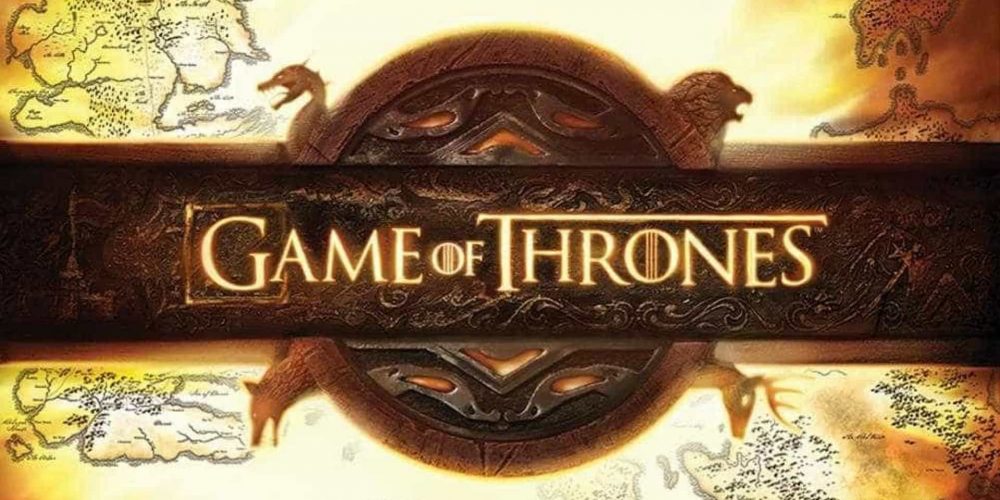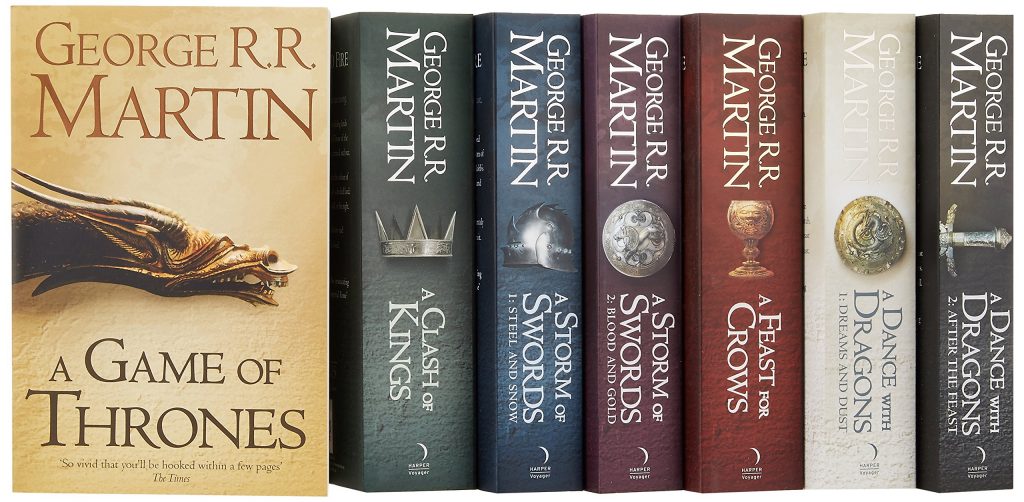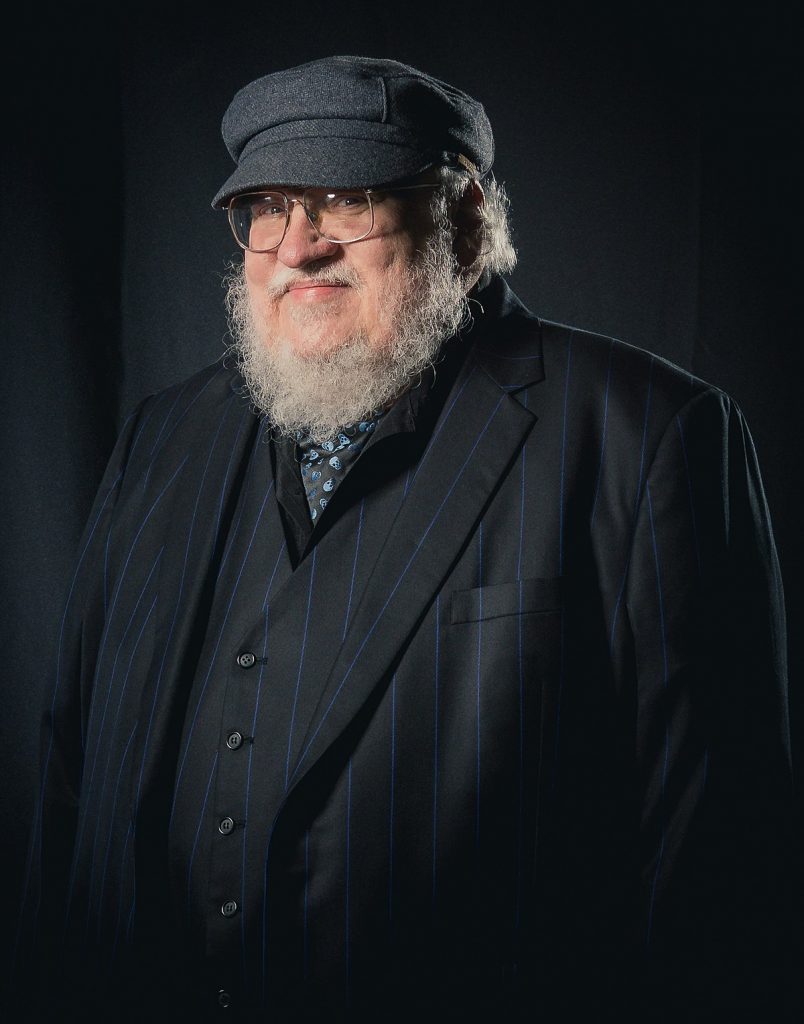Let us take a look at what really happened to Game of Thrones, shall we?
Let us take a look at what really happened to Game of Thrones, shall we?
Authorship in the Contemporary Culture Industry
Authorship in the Contemporary Culture Industry

It is rare to find an artwork in the contemporary culture industry that does not include elements already seen in the past, does not use clichés and/or cannot be tracked back to any other work that has been created before. Hence, it is hard to find artworks of any discipline that are not an adaptation of some sort. Identifying authors who include and focus solely on their individual styles while making art is becoming more difficult than ever. Many factors influencing the industry have major effects on the production, artistic vision of the author and even on the outcome of (e.g.) a film. These elements can lead to either the success or the failure of a project. But what are the effects of the contemporary culture industry on the notion of authorship, especially when it comes to adaptations? To attempt an answer to this question, let’s focus on the 21st century TV show, Game of Thrones, the adaptation of the book series A Song of Ice and Fire written by George R. R. Martin.
In the 21st century, sites like Netflix, HBO, Amazon Prime, etc. are slowly establishing themselves strongly in the culture industry, consequently reducing the success associated with feature films shown in cinemas. As such, streaming culture should not mean a danger to the authorship of the work because production still has to go underway. Regardless, it is changing the perception and reception of the project. Success has always been measured by the amount and types of awards attributed to a product. The more “little statues” authors receive (Oscars, Golden Globes, etc.), the higher their reputation becomes. However, with streaming becoming more popular than going to the cinema, the importance of viewing rates has risen. With it comes a possible recognition within the contemporary culture industry: getting attention through the online platforms. So, if the attention through streaming culture brings the authors and their works the kind of recognition they desire, the importance of the “little statues” is reduced, giving audiences a whole new kind of power.
It is rare to find an artwork in the contemporary culture industry that does not include elements already seen in the past, does not use clichés and/or cannot be tracked back to any other work that has been created before. Hence, it is hard to find artworks of any discipline that are not an adaptation of some sort. Identifying authors who include and focus solely on their individual styles while making art is becoming more difficult than ever. Many factors influencing the industry have major effects on the production, artistic vision of the author and even on the outcome of (e.g.) a film. These elements can lead to either the success or the failure of a project. But what are the effects of the contemporary culture industry on the notion of authorship, especially when it comes to adaptations? To attempt an answer to this question, let’s focus on the 21st century TV show, Game of Thrones, the adaptation of the book series A Song of Ice and Fire written by George R. R. Martin.
In the 21st century, sites like Netflix, HBO, Amazon Prime, etc. are slowly establishing themselves strongly in the culture industry, consequently reducing the success associated with feature films shown in cinemas. As such, streaming culture should not mean a danger to the authorship of the work because production still has to go underway. Regardless, it is changing the perception and reception of the project. Success has always been measured by the amount and types of awards attributed to a product. The more “little statues” authors receive (Oscars, Golden Globes, etc.), the higher their reputation becomes. However, with streaming becoming more popular than going to the cinema, the importance of viewing rates has risen. With it comes a possible recognition within the contemporary culture industry: getting attention through the online platforms. So, if the attention through streaming culture brings the authors and their works the kind of recognition they desire, the importance of the “little statues” is reduced, giving audiences a whole new kind of power.
The industry changed by giving space and possibilities for audiences to engage with artworks (publicly raising their voice online, fanfiction, etc.) and, in many cases, this new dynamic affects the outcome of a cultural product, just like it did with Game of Thrones.
In an industry where fast mass consumption is the goal, recognition, reputation, and money are determined by the more content production companies, artists, streaming sites push out of themselves. In this dynamic race, it is nearly impossible to create individual content, as there is too much produced too fast. The focus is on quantity, not necessarily on quality. Individual, authentic content has lost its value and single authorship carries a reduced meaning. With the reduced importance of individuality, a wave of adaptations has risen. References, resemblances and ongoing continuations of original ideas are created out of Shakespeare plays from 400 years ago, Quentin Tarantino movies from the ’90s or modern fictional book series, such as A Song of Ice and Fire by George R. R. Martin, being turned into a phenomenal TV show. This new tendency just makes it difficult to distinguish the rightful authors of a cultural product. Is it the author, the scriptwriter, the director? Who knows!


The industry changed by giving space and possibilities for audiences to engage with artworks (publicly raising their voice online, fanfiction, etc.) and, in many cases, this new dynamic affects the outcome of a cultural product, just like it did with Game of Thrones.
In an industry where fast mass consumption is the goal, recognition, reputation, and money are determined by the more content production companies, artists, streaming sites push out of themselves. In this dynamic race, it is nearly impossible to create individual content, as there is too much produced too fast. The focus is on quantity, not necessarily on quality. Individual, authentic content has lost its value and single authorship carries a reduced meaning. With the reduced importance of individuality, a wave of adaptations has risen. References, resemblances and ongoing continuations of original ideas are created out of Shakespeare plays from 400 years ago, Quentin Tarantino movies from the ’90s or modern fictional book series, such as A Song of Ice and Fire by George R. R. Martin, being turned into a phenomenal TV show. This new tendency just makes it difficult to distinguish the rightful authors of a cultural product. Is it the author, the scriptwriter, the director? Who knows!

(! WARNING ! Sensitive topic incoming…) What happened to Game of Thrones?
George R. R. Martin started with the first book in 1996. The book series was originally supposed to have 7 volumes in total. At the same time as he published the 5th book in 2011, the show, based on the novels but called, Game of Thrones premiered. Martin made a deal with HBO executive producers Daniel Benioff and D. B. Weiss, better known as D&D (no, not Dungeons and Dragons), to bring an adaptation of the books onto the screen. This agreement created a kind of conjoined authorship between the three parties. D&D worked as executive producers, writers, and directors, also placing them as authors, but under Martin in the hierarchy, since the show did not differ from the books’ narrative that much. In fact, it only needed to be simplified from the story created by the original author.
The series became a phenomenon in TV history. It was by far the most original type of adaptation the industry had seen in a while, giving Martin’s books a whole new kind of reputation and, as one could have guessed, a lot of money. The fact that Martin gained such a reputation through the success of Game of Thrones, through the attention of many millions of viewers and readers, made him take a decision that would later cause the end of the whole journey. He realized that he did not need to continue his job as an author of the books, because he had already achieved the goal of being rich and famous. He abandoned his responsibilities and role as the author and did not write the 6th book, leaving D&D, the two showrunners, without a narratological stepping ground for the tv series. Even though Daniel Benioff and D. B. Weiss took on their new responsibilities as full authors and tried to finish the story, it was impossible without the literary background of the main author.

(! WARNING ! Sensitive topic incoming…) What happened to Game of Thrones?
George R. R. Martin started with the first book in 1996. The book series was originally supposed to have 7 volumes in total. At the same time as he published the 5th book in 2011, the show, based on the novels but called, Game of Thrones premiered. Martin made a deal with HBO executive producers Daniel Benioff and D. B. Weiss, better known as D&D (no, not Dungeons and Dragons), to bring an adaptation of the books onto the screen. This agreement created a kind of conjoined authorship between the three parties. D&D worked as executive producers, writers, and directors, also placing them as authors, but under Martin in the hierarchy, since the show did not differ from the books’ narrative that much. In fact, it only needed to be simplified from the story created by the original author.
The series became a phenomenon in TV history. It was by far the most original type of adaptation the industry had seen in a while, giving Martin’s books a whole new kind of reputation and, as one could have guessed, a lot of money. The fact that Martin gained such a reputation through the success of Game of Thrones, through the attention of many millions of viewers and readers, made him take a decision that would later cause the end of the whole journey. He realized that he did not need to continue his job as an author of the books, because he had already achieved the goal of being rich and famous. He abandoned his responsibilities and role as the author and did not write the 6th book, leaving D&D, the two showrunners, without a narratological stepping ground for the tv series. Even though Daniel Benioff and D. B. Weiss took on their new responsibilities as full authors and tried to finish the story, it was impossible without the literary background of the main author.
Throughout the last seasons, the tension between the non-literary quality authorship and the high expectations of the viewers made the producers let their responsibilities as authors down. They rushed through the production as fast as possible, since they wanted to please their audience, hence, not paying attention to the details which was actually the very reason behind the high level of fandom involvement in the Game of Thrones phenomenon. The showrunners wished to get rid of the project as soon as possible, contradicting the demands of both the viewers and HBO itself. Realizing they could not reach the audience’s expectations, the project was, once again, abandoned and let down by its (newly main) authors. This trajectory shows that authors have an impact on the outcome of their projects, no matter what. In this case, Martin’s leaving and placing all the responsibilities on D&D is what brought the show to the failure that it ended up being. The show lost its authorial voice, because the authorial position was transferred to others and that led to the series’ ending which, let’s be frank, was a complete disappointment.
The case of Game of Thrones demonstrates how difficult it is to find and explain how true authorship works in the contemporary culture industry. The increasing level of audience involvement, the changing set of values in mass consumption that favors commercial success more than aesthetic quality, and the commonness of adaptations all influence the notion of authorship and the authors themselves. It becomes clear that there cannot be one kind of authorship defined since the industry is always in movement. The notion needs to be flexible, widened from time to time along with the continuously changing cultural environment.
Throughout the last seasons, the tension between the non-literary quality authorship and the high expectations of the viewers made the producers let their responsibilities as authors down. They rushed through the production as fast as possible, since they wanted to please their audience, hence, not paying attention to the details which was actually the very reason behind the high level of fandom involvement in the Game of Thrones phenomenon. The showrunners wished to get rid of the project as soon as possible, contradicting the demands of both the viewers and HBO itself. Realizing they could not reach the audience’s expectations, the project was, once again, abandoned and let down by its (newly main) authors. This trajectory shows that authors have an impact on the outcome of their projects, no matter what. In this case, Martin’s leaving and placing all the responsibilities on D&D is what brought the show to the failure that it ended up being. The show lost its authorial voice, because the authorial position was transferred to others and that led to the series’ ending which, let’s be frank, was a complete disappointment.
The case of Game of Thrones demonstrates how difficult it is to find and explain how true authorship works in the contemporary culture industry. The increasing level of audience involvement, the changing set of values in mass consumption that favors commercial success more than aesthetic quality, and the commonness of adaptations all influence the notion of authorship and the authors themselves. It becomes clear that there cannot be one kind of authorship defined since the industry is always in movement. The notion needs to be flexible, widened from time to time along with the continuously changing cultural environment.